Why You Work Out All The Time But Aren’t Getting Any Stronger
The other day I got a message from a follower. She wanted me to explain why she worked out all the time but wasn’t getting any stronger. I started typing her a novel and then realized this: If I was gonna spend a bunch of time on a response to someone who isn’t a paying client, I might as well turn it into free content that others could benefit from as well. I suspect that many others might be wondering the same thing.
“Why do I work out all the time, feel like I’m running in circles and running myself into the ground but seemingly getting nowhere?”
I used to ask myself this question all the time. I would often liken the feeling to being on a treadmill that was going too fast, hanging on for dear life, because if I didn’t, at any moment I would fly off the back and fall flat on my face. (Also, I probably spent way more time that I cared to admit on the treadmill. LOL.)
Maybe you can relate?
In any case, I’m willing to bet that if you’re someone who likes to work out pretty regularly, you may be wondering why you aren’t seeing the results that you want. Why you aren’t getting any stronger? Why you still can’t do decent push-ups from your toes and why you don’t look as “toned” as the fitness influencers you follow?
I have a few ideas as to why this may be the case for you. So let’s break it down.
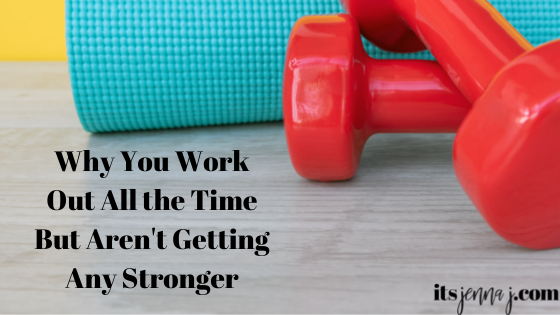
You work out too much.
AKA not giving yourself a chance to rest & recover. AKA over-training. When this happens, little injuries can start to creep up. Your knee feels wonky. You tweak your lower back. Your form starts to suffer. Muscles don’t get stronger when you’re doing the exercise. They get stronger when you give them the time (and fuel) to repair and recover. So when you decide you’re gonna start doing yoga, but only the heated class with the weights because it’s harder (that’s yoga flavored group fitness, not actual yoga BTW) you’re likely setting yourself up for burnout.
You’re doing mostly group fitness classes.
Listen, I get it. Group fitness classes can be fun. So before you @ me for bashing your favorite one, know that I used to teach them too. There’s nothing wrong with group fitness if you’re doing it for enjoyment, to get your heart rate up, to feel good, whatever. But if you’ve been taking the same class format forever, eventually you’ll stop seeing as much growth & progress as you did initially.
Most group fitness classes are designed to fit a specific template. This can only take you so far. Plus, in many group fitness settings, the instructors are not coordinating with each other. So if you work out with Hannah on Monday, Becky on Tuesday, Blake on Wednesday, and Casey on Friday, chances are you’re gonna wind up doing the same exercises with the same weights the same way all the time. AKA squats with pulses and isometric holds to the beat of a Lady Gaga song. Is it fun? 100%. Does it “count” absolutely. But is it helping you get stronger? Not as much as you may think.
You’re not lifting heavy enough.
It doesn’t make a difference if it feels hard in the moment, if you’re only doing lighter weights/higher reps you’re selling yourself short. “Heavy” is relative. Those variables might be great for endurance, but it’s not actually going to get you stronger if it’s the only way you ever lift. Stop listening to people who tell you women shouldn’t lift heavy weights because it will make them “bulky”. Also stop listening to people who tell you that it won’t. The truth of the matter is, it’s hard to tell how your body will respond to lifting weights. Everyone is different. The more important questions we should be asking: Why are we trading the chance to have strong, capable, functional bodies for the chance to conform to patriarchal beauty standards? If you wanna get stronger you’re gonna eventually need more than 3-8lb dumbbells.
You’re not actually strength training.
This kinda goes along with the last one. I’m sorry to say it, but just because you’re happen to be holding weights, it doesn’t necessarily mean you’re strength training. When you do everything at the same intensity (usually a high one that feels like cardio), you’re not able to make the most of each exercise. AKA get your full range of motion, focus on good form, lift as heavy as you might be able to. When you turn everything into HIIT or cardio you’re selling yourself short when it comes to strength gains.
Again, there’s nothing wrong with HIIT or cardio, but use them for their intended purpose. A well designed strength training program from a qualified coach will ebb and flow you through different set & rep ranges, different tempos, different intensities, and different exercise variations. In fact, if actually building strength is your goal, following a program is likely your best bet.
You’re conflating getting stronger and looking “toned”.
Do you actually want to be stronger, or do you just want to look like what we’ve been conditioned to believe “strong” looks like in our culture? AKA lean with visible muscle definition? Get honest with yourself about what you actually want. I don’t blame you if you do want that. It’s one of the most highly praised accomplishments & traits in our society. Why wouldn’t you want that? But also. . . the way that you’d need to work out and eat to achieve that look are very different than if you’re training for general strength and fitness with your whole health in mind. In fact, I’m willing to bet if you knew what you’d have to do to get that look, you wouldn’t be interested in doing it. Just ask a bikini competitor or body builder.
You’re not tracking your progress.
Hear me out on this one, because a former version of me would have told you not to do it. My take on it now: tracking your fitness progress is not inherently diet culture. In fact, there are plenty of ways to do it that don’t involve being obsessive or overly focused on aesthetics. Before you do this, it’s important to know where you are in your relationship with exercise. Make sure that you’re not trading measuring your worth by the number on the scale for the amount of weight you can lift. (Another flavor of the same shit sandwich.) All that being said, if you don’t know where you’re going, you may end up somewhere you don’t want to be. Making a few notes about the weight you lifted, how may reps & sets, and how it felt can go a long way in helping you reach a strength goal.
You’re taking advice that wasn’t meant for you.
It’s important to be discerning when you’re following health and fitness advice on the internet. Most content creators have a certain type of person in mind when they create posts. I, for example often write with a former version of myself in mind. Someone who genuinely likes to work out but sometimes takes it too far, has started learning about diet culture and why it’s harmful and wants to figure out how fitness fits in to their life without it. Some personal trainers are speaking to people who have never worked out in their lives. Some are speaking to competitive athletes. In other words, not all of them are talking to you. Following advice that wasn’t meant for you will only help you reach someone else’s goals.
We weren’t all mean to be skinny.
Or muscular. Or dare I say it, even super freaking strong. I don’t want that to discourage you. Because I truly believe that strength training is for everybody. Everyone can get stronger. Everyone can build muscle. AND if doesn’t necessarily come easily to everyone. At least not in the same way. Let me share something that may surprise you: It DOES come easily to many of the people who work in the fitness industry. Because don’t we all gravitate towards careers that are suited to the things we’re good at and enjoy?
That’s not to say that we don’t work hard. But here’s a confession: I might be the most naturally skinny person, but I’m not naturally fat either. I build muscle easily. I have more fast-twitch muscle fibers, which means I’m more suited to activities like the explosive kettlebell swings and heavy snatches that you see me posting on my instagram stories. Things I really suck at and don’t do much of: distance running, math, most things that are even remotely adulty. LOL.
The next time you feel bad that you don’t look or perform like your personal trainer, imagine them trying to do YOUR job or a hobby that you’re really good at. Then have a good laugh. Because we’d probably suck at it. How many personal trainers do you know that would actually admit that?
Whelp. That was a lot of tough love right there.
And probably a lot of stuff that you didn’t want to hear. But even though it can be tough to swallow, there’s also something really freeing about knowing that you’re not broken. You’ve likely been following advice that’s not right for you, or have had unrealistic expectations all along. That’s the big takeaway here. If you feel like you’re running yourself into the ground and not seeing the results that you want, it’s not because you’re broken or your body is wrong or that there’s some big piece of the puzzle you’re missing.
You. Are. Not. Broken. I can’t emphasize that enough.
If you like the idea of building real strength from a place of self-care rather than self-destruction but don’t know where to start, my online group coaching program Tough Love Strength Club would be a great place for you. TLSC is where I show you how to approach fitness without the side of diet culture that it’s normally served with. If you wanna learn work out in a way that is aligned with the things that really matter to you and stop caring so much about your pants size or the number on the scale, apply to join us here!

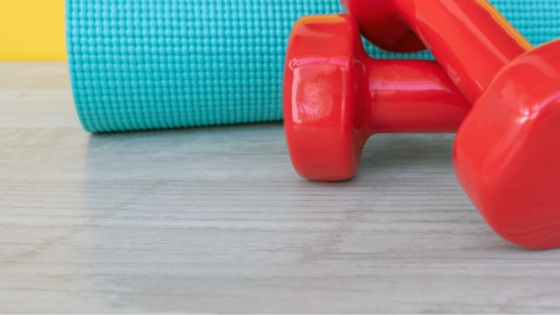
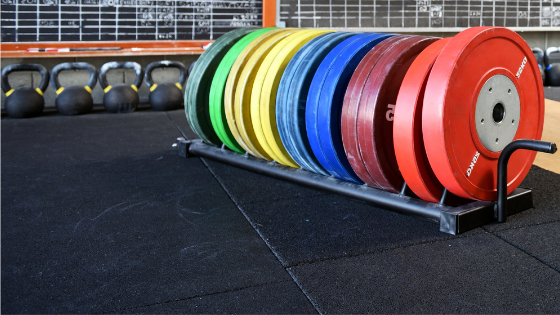

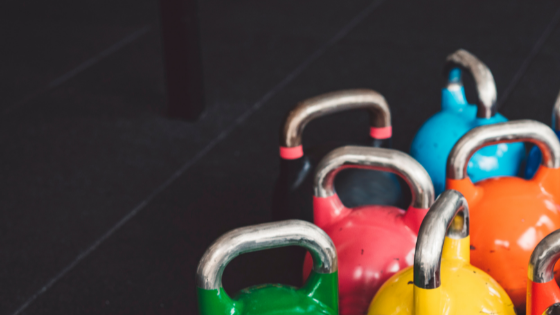
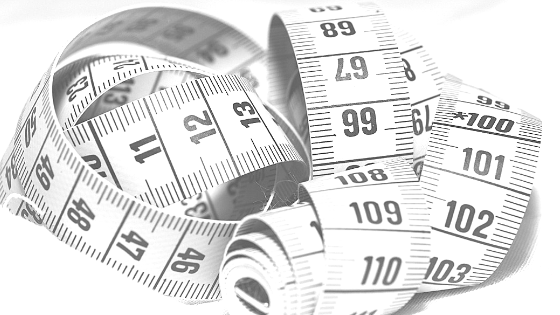

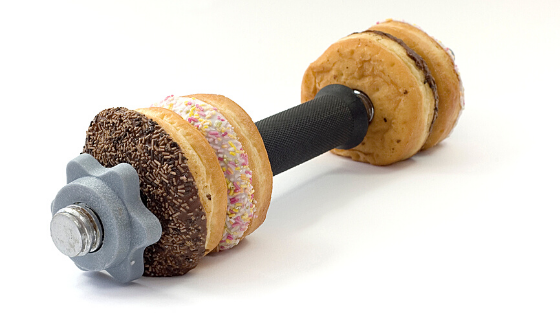
One Comment